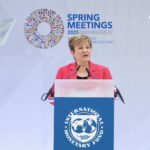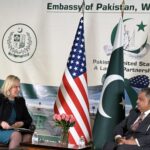On May 9, 2025, the Executive Board of the International Monetary Fund (IMF) approved a $1 billion disbursement to Pakistan under the Extended Fund Facility (EFF), bringing total disbursements under the arrangement to approximately $2.1 billion.
In a parallel decision, the Board also approved a request under the Resilience and Sustainability Facility (RSF), aimed at supporting “Pakistan’s efforts in building economic resilience to climate vulnerabilities and natural disasters, with access of around $1.4 billion,” according to an IMF statement.
India had previously urged the IMF to scrutinize loan requests from Pakistan, following a terrorist attack that claimed 26 lives on April 22, at Pahalgam, in Jammu and Kashmir.
In response to the IMF’s approval of over $2.3 billion through the EFF and RSF mechanisms, India’s Ministry of Finance issued a strong statement on May 9 criticizing the decision. “As an active and responsible member country, India raised concerns over the efficacy of IMF programs in case of Pakistan given its poor track record, and also on the possibility of misuse of debt financing funds for state sponsored cross border terrorism.”
India abstained from the May 9 vote, but its objections and abstention were formally acknowledged by the IMF Board.
The Finance Ministry further stated that “rewarding continued sponsorship of cross-border terrorism sends a dangerous message to the global community, exposes funding agencies and donors to reputational risks, and makes a mockery of global values.”
It also emphasized that concerns over the potential misuse of fungible financing from institutions like the IMF for military or state-sponsored cross-border terrorism were echoed by several member countries. However, the Ministry noted that the IMF’s ability to act on such concerns remains limited by its technical and procedural framework.
“This is a serious gap highlighting the urgent need to ensure that moral values are given appropriate consideration in the procedures followed by global financial institutions,” the statement added.
Following the Board’s deliberations, IMF Deputy Managing Director and Chair Nigel Clarke acknowledged the progress made by Pakistan in stabilizing its economy under challenging circumstances.
“Since the approval of the Extended Fund Facility, the economy continues to recover, with inflation sharply lower and external buffers notably stronger,” Clarke said. “Risks to the outlook remain elevated, however, particularly from global economic policy uncertainty, rising geopolitical tensions, and persistent domestic vulnerabilities.”
The statement underscored the need for Pakistani authorities to maintain sound macroeconomic policies and accelerate reforms to preserve recent gains and promote medium-term, private sector-led sustainable growth.
Meanwhile, Prime Minister Shehbaz Sharif, in a statement expressed satisfaction over the IMF’s approval of the $1 billion tranche for Pakistan, noting India’s attempts to stop the IMF program failed.






